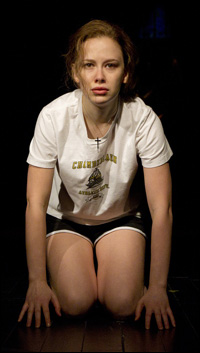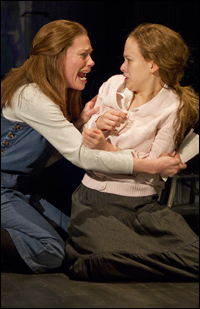
Director Stafford Arima (Altar Boyz, Tin Pan Alley Rag, Somewhere in Time, London's Ragtime) helms the new incarnation of the 1988 musical that has received an overhaul from original writers Michael Gore ("Fame," "Terms of Endearment"), Dean Pitchford ("Fame," "Footloose") and film screenwriter Lawrence D. Cohen.
Playbill.com caught up with Ranson, who gives a break-out musical theatre performance in the titular role – and Mazzie – who plays Margaret White, Carrie's bible-toting mom, who must save her daughter from damnation.
Playbill: What were your first Carrie experiences? The film, the novel, the musical?
Molly Ranson: I had always been a fan of the film. I love scary movies, and I loved "Carrie" growing up. And, weirdly, I happened to watch the movie "Carrie" probably a day before I got my audition for it, so it was kind of just a strange thing. But, I always loved the story.
Marin Mazzie: Actually, my first Carrie experience would be the musical. I saw the musical in 1988 and I had never seen the movie. I didn't like scary movies when I was younger, so, I didn't see it! Obviously, I always saw the film clips of the hand at the end, which is the scariest part of the movie. It's an amazing movie. I have now seen the movie, of course. It's really not, to me, a horror movie. It's an exciting thriller. It's the story about this girl, which is what we're doing, too. And, now I've read the novel. I've read the novel a couple of times. Marin, what do you remember from the original 1988 production? What has lingered with you from that experience?
MM: Well, there's some things that probably are not in our production that have lingered with me like the pig blood and that sort of thing. There's still pig's blood, but it's not as literal as it was in the [Broadway] musical. The shower scene I remember, the revolving doors, and, you know, the visual things are things that I remember — the big staircase that Betty Buckley walked down.
 |
||
| Ranson in Carrie. |
||
| photo by Joan Marcus |
MR: It's been great. It's unlike anything I've ever done—getting to work on a character for two years and finally having it happen now after two years of working on it. She's such a complex, interesting character. She gets to be on both sides of the spectrum of being this really shy, downtrodden, kind of abused person to finding her strength in the most exciting, thrilling, terrifying ways.
This is a fresh look at the musical and in essence, Stephen King's original story, right?
MR: I mean, at its core, Carrie is a very, very human story that I think everyone can relate to – the feeling of being an outsider at one point or another. It's especially relevant now, more than ever, with all the bullying that's coming to the forefront of consciousness in our nation right now. We're hearing this in the media all the time about these kids taking drastic measures, and now, I think, is a really great time to be doing it.
Marin, what's the heart of the story for you?
MM: To me, it's about a mother and daughter's love. It's a story about a girl who is different. She loves her mother, who is religious and has raised her in the way that she feels is right in protecting her. From my point-of-view, it's the unquestioning, deep, deep love for my daughter, and really my true beliefs that what I'm doing is right. But because of it, Carrie is not accepted at school. These are issues that we deal with now really openly. I think that obviously they have always been a part of the world, but really, right now, are such a part of the world.
In the film and earlier incarnation of the musical, Margaret is an almost terrorizing figure. How do you keep her human?
MM: That's hopefully what we're going to bring to it. What I've worked on with our director Stafford Arima and the authors is trying to make people understand her point-of-view, whether or not you agree with it, but that you understand where she's coming from, and that you can, as I have, admire someone whose beliefs are so unwavering. There's nothing that will change that. And, it's heartbreaking, but it's so true. To play somebody like that is really exciting and challenging, too.
 |
||
| Marin Mazzie |
||
| Photo by Mike Sharkey |
MR: The score is amazing. More than half of it, I think, is new from the 1988 production, so people will be excited, hopefully, to hear the new stuff, but, also, some of the old favorites are still in there.
MM: There's a lot of new stuff. Margaret and Carrie stuff is basically intact, but a lot of new things for the kids, and even things you have heard, you will hear them in a whole other way because of what AnnMarie Milazzo and Mary-Mitchell Campbell have done, who are amazing!
Marin, you sing one of the legendary songs, "And Eve Was Weak."
MM: I think that's one of those perfect theatre moments. You take four minutes of theatre, and you can pick things out of shows and go, "That's perfect. That's perfect." I would say that that's pretty perfect, so I'm really lucky to be able to do it. It's so emotionally wrenching, and it's the first thing I do. You came from doing Next to Normal on Broadway, so you're ready to go!
MM: Yes. [Laughs.] I'll just cry through the rest of my life. You know, that's all right!
 |
||
| Mazzie and Ranson in Carrie. |
||
| photo by Joan Marcus |
MM: I think it comes just from what the story actually is. I mean, you're going to feel so close when this girl gets made fun of — when kids are mean to her. It's going to be right in your face, and that, to me, is hard to watch. When I'm watching it in the rehearsal space, I'm crying watching these things that happen to her, and then, how she blossoms and how she comes out of her shell. And then, you know, things happen. [Laughs.] It doesn't all go so well! But, I think, for the audience, being this close and this intimate is going to be really devastating and great.
MR: It's a very psychological, kind of disturbing story, and we are very much in tune with that side of it. I think that the Lucille Lortel is a great space rather than a huge Broadway house. I think that something that is so intimate has a bit of a creepier, realer feel to it, which is perfect for us.
Click here to read Playbill.com's opening night coverage of Carrie.










